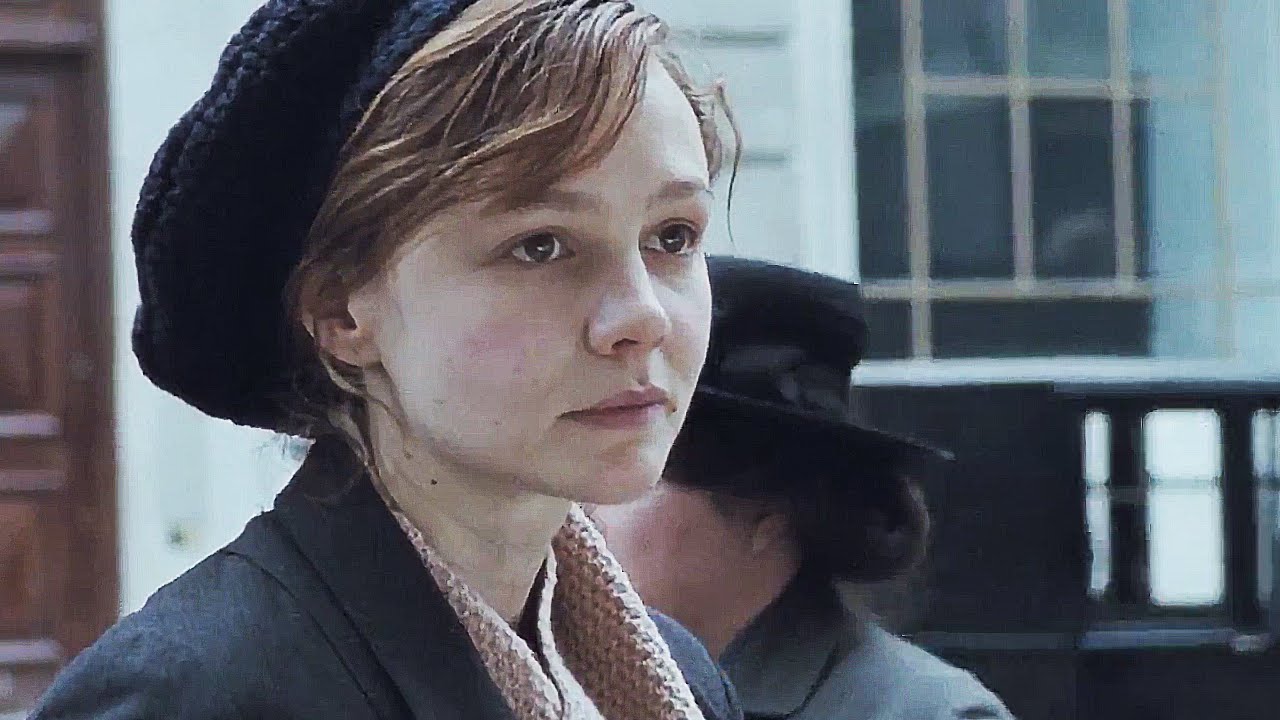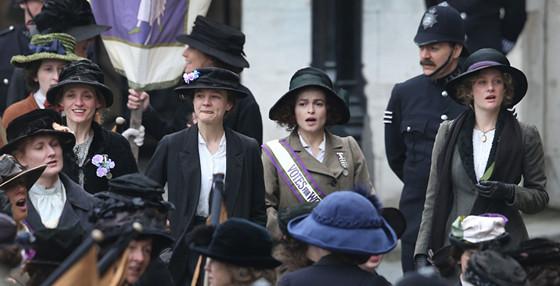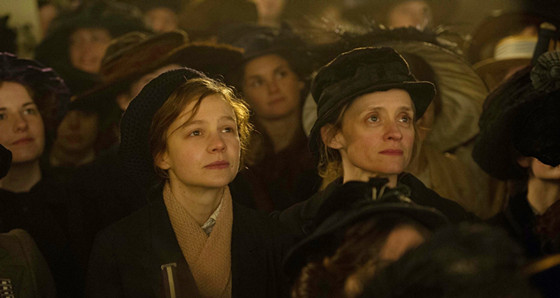“You want me to respect the law? Then make the law respectable,” spits a frustrated Maud Watts, played with equal parts tenderness and tenacity by Carey Mulligan (An Education, Shame) in Sarah Gavron’s pulse-pounding period drama, Suffragette.
Maud is a fictional working-class mother and laundress in London’s East End, who in 1912 finds herself swept up in the women’s suffrage movement and Gavron’s film vividly portrays her political awakening amidst real-life events in the struggle for electoral equality at the dawn of the 20th-century women’s rights movement.
Gavron (Brick Lane) presents her historical fiction—the events are all true, as are many of the characters, but a number of them are inventions of screenwriter Abi Morgan—with an urgent, called-for impetus. Adopting a cinéma vérité vein with handheld impermanence, frequent and invasive closeups, dissimilar natural lighting and sudden eruptions of cruel colors amidst mostly muted tones, she creates an urgent and demanding docudrama quality.
While running an errand for her abusive boss, Norman Taylor (Geoff Bell)—whom we later see sexually assaulting one of his teenage woman employees—Maud witnesses an act of civil disobedience on Oxford Street as a group of suffragettes smash shop windows. It’s a nimble inauguration to the activism of the Women’s Social and Political Union (WSPU), whose motto of “Deeds Not Words” resonates with Maud as she rouses to the misconduct and injustices all around her.
When her co-worker and colleague, Violet Miller (Anne-Marie Duff, excellent)—who’s daughter Maggie (Grace Stotter) we saw Norman molesting earlier—is too beaten and bruised by her abusive husband to testify regarding women’s working conditions at an imperative parliamentary hearing Maud reluctantly agrees to evince testimony in her place.
Maud’s victory is short lived, her appearance in parliament—maddening to the modern viewer as it’s accurately populated with privileged white male chauvinists who mock and jeer the beleaguered women—while somewhat empowering, puts a strain on her marriage. Her husband, Sonny (Ben Whishaw), feels somewhat emasculated by Maud, her feminist propensity and her new social circle.
The couple have a young boy, George (Adam Michael Dodd), and tender moments between him and Maud are among the few heartening asides she’s allowed as her path to social activism gains thrust and impetus.
It’s shocking how the suffragette movement has, until this revealing and effectual film, been given very little cinematic exposure. The only memorable instance in modern film is a brief number in Mary Poppins (1964) wherein Winifred Banks (Glynis Johns) sings “Sister Suffragette”.
Johns’ song is somewhat stymied and impaired when you consider how Winifred is portrayed as doting, easily distracted, and played largely for laughs. Luckily there’s no such sophistry here, though there are times during Suffragette when the message-driven narrative dives into didacticism. But maybe a history lesson is what modern audiences need, and that’s certainly part of Gavron’s delineative swerve.
In a brusque but central scene Maud attends a brief public appearance and impassioned speech from WSPU magnate, activist and suffragette leader Emmeline Pankhurst (Meryl Streep), who tells her to “never surrender,” before being whisked away to safety as the authorities ascend upon their public gathering. It’s the sort of aphorism that Maud needs to hear, and it works.
Maud divides her time between the laundry and her new activist friends, including outspoken pharmacist Edith Ellyn, portrayed with suitable vaunts and conviction from the ever irrefutable Helena Bonham Carter (Fight Club, The King’s Speech), she also meets Inspector Arthur Steed (Brendan Gleeson), who heads an investigation to quell the suffragette movement utilizing modernistic surveillance cameras, and other underhand tactics.
As Maud’s self-actualization and canonization continues, her home life is threatened. Sonny, while not outrightly ignoble, folds under the scrutiny and social pressures of his peers and punishes Maude, first by throwing her out of their home, and then by having their son adopted. These sequences are justifiably gaunt and gut-wrenching, Gavron’s fondness for arrant, almost invasive closeups are well obliged by Mulligan.
She’s an expressive, charitable and athletic performer, her nuance and mien allows for powerful cinematic portraiture as she conveys inner conviction, marred simplicity and maternal suffering with but a tremble of her lip and an uneasy rimple of her brow. Maud’s transformation from carefully hanging back partisan to full-fledged enraged outlaw is something of a revelation.
Much of Suffragette is as revelatory as it is terrible, and feelings of dirge-like edification do surface. When Maud and Edith spend a stay in prison for being suspiciously in the vicinity of post boxes that were bombed, they resort to a hunger strike in an attempt to draw attention to their struggle.
This results in a gruesome sequence where Maud is restrained and force fed, a violation that is not lost on Inspector Steed, whose resolution is shaken as shades of understanding and fury finally penetrate his patriarchal facade.
Suffragette isn’t all offence and elegy. Even when the setting shifts to the Epsom Derby, the scene of a real-life tragedy as militant suffragette and subsequent martyr Emily Wilding Davison (Natalie Press) was trampled to death trying to attach a scarf to the bridle of the King’s horse there is respite.
As Maud bears witness to the fatal collision then regains her composure enough to retrieve Emily’s scarf—emblazoned with the now familiar WSPU motto “Deeds Not Words”—Inspector Steed, who intended to make another arrest, falters. He too is overcome with tremor and remorse. He lets Maud go, he doesn’t interfere, at last, his gaze seems undarkened, is he finally on the jutting precipice of an awakening? A preamble to what the future must justly proclaim? So it seems.
The massive funeral procession for Emily numbered in the thousands and her message at last reached an international audience. Gavron’s recreation of this permeating moment in the suffrage movement is given a tactful and compelling pretense, the muted and subdued color palette somehow offers an expansive and advantaged observation, which, when combined with authentic footage of the cortege, complete with flag waving WSPU standard bearers, it lands like lightning. Suffragette is easily one of the most important, relevant, and refreshing films of this or any year.
Gavron’s film serves not just as a look backward at the slow climb to equality, it also functions as an eloquent intimation of the still flourishing and ever-evolving feminist movement. On the surface it’s about a brave workaday woman with a destiny no more heroic and clement than yours or mine. It’s also about something deeper, more declarative, and empowering than that, too.
It has more authenticity and amity than almost any film in recent memory. Suffragette’s heart is unequaled, and it exceeds cinema. It’s something more substantial than us all.
Taste of Cinema Rating: 4.5 stars (out of 5)
Author Bio: Shane Scott-Travis is a film critic, screenwriter, comic book author/illustrator and cineaste. Currently residing in Vancouver, Canada, Shane can often be found at the cinema, the dog park, or off in a corner someplace, paraphrasing Groucho Marx. Follow Shane on Twitter @ShaneScottravis.


